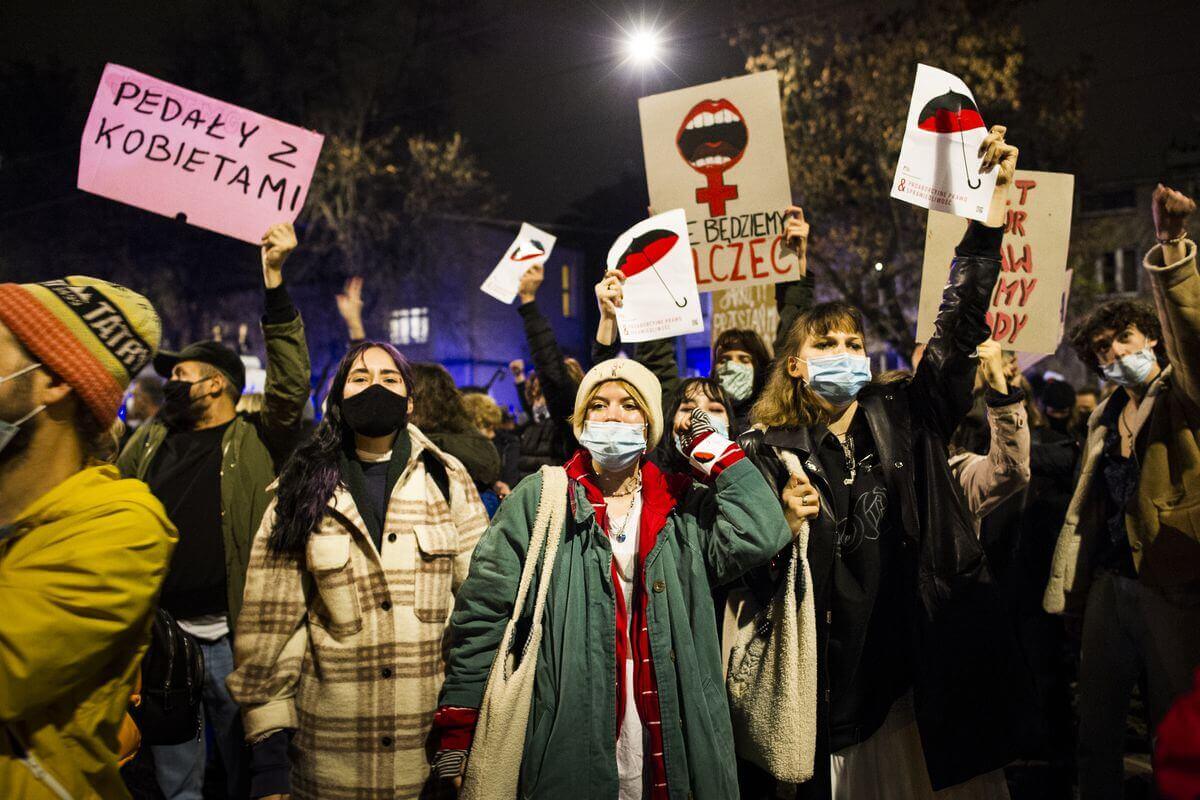Since Thursday night, thousands of Polish women have been protesting the tightening of the European country’s already strict abortion laws. According to a Constitutional Court’s decision on 22 October, the termination of pregnancy due to congenital disabilities in the fetus has been deemed unconstitutional. Therefore, Polish women can only legally abort fetuses in cases of rape, incest, or threat to the mother’s life. Since these cases only make up 2% of the legally terminated pregnancies in the conservative nation, the ruling has virtually put an end to all forms of voluntary abortion. This has been perceived as a significant blow to women’s reproductive health rights in Poland.
In the capital city of Warsaw, clashes between protestors and security forces turned violent, with the police breaking out pepper spray in some instances and arresting at least 15 demonstrators. Women’s rights activists also staged protests both inside and outside churches on Sunday, disrupting weekly masses. Consequently, they have been criticized for their “barbaric” actions by church authorities. In Katowice, a large number of riot police were deployed to separate protestors after they clashed with 30 members of the All-Polish Youth, an ultranationalist far-right group. After the women’s rights protestors began to push back, the security forces also used tear gas.
Associated Press (AP) reported that a group of far-right nationalist Catholics at the Holy Cross Church in Warsaw grabbed a woman and forced her downstairs after she managed to enter the church that they were guarding. The AP article further referenced a video from Szczecinek which showed young women encircling a priest and yelling at him to “F—- off” and “Go back to the church.” Some signboards and slogans from other parts of the country included, “this is war”, “human law, not ecclesiastical law”, and “we want choice, not PiS terror”, referring to the Polish acronym for Jaroslaw Kaczyński’s Law and Justice party, which has been ruling the country in an absolute majority since 2015 and slowly sliding the country towards authoritarianism.
Poland’s Roman Catholic Church has long-been venerated as the country’s highest authority. They earned this position during the communist regime, where priests supported pro-democracy protestors in their freedom struggle, and the late Pope St. John Paul II was heralded as a national hero. However, scenes of young and angry women storming churches and confronting priests signal a major historical shift in the country, whose abortion laws were already the strictest in Europe. The demonstrations are all the more crucial as opinion polls reflect a “clear majority” against further restrictions on abortions in the country. “The position of the Catholic Church on the right to life is unchanged; obscenities, violence and disrupting services, as well as profanation, are not the right method of action,” said Poznan Archbishop Stanislaw Gadecki, the chairman of the Polish Bishops’ Conference. The protests are occurring amidst the church’s tacit support for the country’s right-wing administration, which comes along with its inability to manage a series of abuse scandals among its clerics.
The events over the past few days have also marked the further escalation of Poland’s cultural war, as women and LGBTQ+ groups turn to radical and more violent protest methods after peaceful lobbying for years have not yielded the desired results. Women’s Strike, the primary organizer of the demonstration, argued that forcing mothers to birth fetuses with severe congenital defects will result in unnecessary and inevitable physical and mental suffering. In fact, the Health Ministry showed that out of the 1,110 legal abortions carried out in the country in 2019, most were due to fetal defects. The group said that city blockades had been planned for Monday, a women’s nationwide strike on Wednesday, and more street protests on Friday.
Dunja Mijatovic, the Council of Europe’s commissioner for human rights, called Thursday a “sad day for women’s rights”. The Guardian has also opined that the judgment is legally flawed, in the sense that the court was “packed with loyalists” to Kaczyński and President Andrzej Duda, who have consolidated power by ignoring democratic consensus and advancing religious and far-right ideological agenda. The Polish government is already locked in a dispute with the European Union Commission over its clampdowns on judicial independence, LGBTQ+ rights, and free media.
The country is also struggling to handle its crippling public health and economic crises. On Saturday, Duda announced that he had tested positive for COVID-19 himself, on the same day that health authorities reported a near-high daily record of 13,628 cases with 179 deaths.
Polish Citizens Protest New Abortion Ban
The country’s apex court's ruling on Thursday effectively banned all voluntary abortions, triggering a round of protests against the authority of the church.
October 26, 2020

SOURCE: GETTY IMAGES
